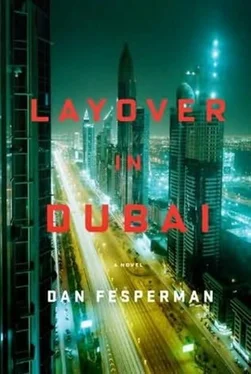“Good luck,” she whispered.
Ali led the way through the front door of the blockhouse. The white billow of his kandoura looked out of place among the mud and the disheveled, wiry laborers, a white bloom of prosperity in a scrap yard of weeds.
Inside, another armed security man eyed them suspiciously. A dark middle-aged man in a wrinkled gray shirt stood up from behind a steel desk littered with paperwork.
“Ali.”
It was a professional greeting. No smiles, handshakes, or hands on the heart. Ali nodded in return and said, “This is Zafar, the foreman. He will look after you.”
Zafar didn’t seem like the type who looked after anyone, except to ensure they gave him a full day of labor. He walked over from the desk, sizing up Sam from head to toe. Spreading a thumb and forefinger like calipers, he clamped them around Sam’s jaw, turning his head one way and then another.
“It is good you not shave,” Zafar said, releasing Sam’s bristly jaw. “Black hair. Brown eyes. These good also. Grow beard. Right now, too white. Too many will stare. Speak only when you must. Only few on your crew speak English.”
“How will I know what they’re telling me to do?”
“You watch. Do what others do. Very easy. You will see.”
He returned to his desk, where he motioned Ali toward a small pile of documents on a front corner. Ali handed a pen to Sam. All the writing was in Arabic.
“Sign them both,” Ali said.
“What are they?”
“One is an employment agreement. The other is a receipt for your uniform, your hard hat, and your boots. They are company property, so you must take care of them.”
Sam obliged, although for all he knew he was selling himself into slavery, just as Ali had joked.
“How much will I be paid?” he asked, trying to make light of it.
Zafar’s answer was businesslike.
“Seven hundred fifty dirhams, one month.”
Roughly two hundred dollars, Sam calculated. Less than a buck an hour.
“We hold first two months’ pay for cost of equipment, housing, medical helpings. I cannot change this because I already make special change for not having passport. Two changes not possible.”
Sam was less worried about pay than the implication that he might be here for months. He turned for reassurance to Ali, who placed a hand on his shoulder. But the man was no longer smiling. Perhaps he, too, was just realizing the gravity of the situation. Or maybe his earlier offhand attitude had been an act, to keep up Sam’s spirits.
“The good news,” Ali said, “is that this is not a Muslim crew. They’re Hindu Bengalis, so perhaps you will not be resented so much. Of course, that means you will also be expected to work on Fridays, the Muslim holy day. Be strong, Mr. Keller. I will do what I can to make sure that your stay here is a short one.”
He turned to go. Sam watched through the doorway as Ali climbed back into the big Mercedes and eased it down the rutted lane. Neither Laleh nor Ali was visible through the tinted windows, and the car was soon swallowed by the crowds. It felt as if his previous life had just disappeared along with the car, so he reached into his pocket for Laleh’s note. Even with that in hand, he hadn’t felt this abandoned since being dropped off for his freshman year in college. And then at least his father had eased the shock by reminding him of what a great adventure he was about to have.
“Now for the fun part,” his father had said, grinning through a surprising flush of tears. “Always look before you leap, son. But don’t ever forget to leap.”
Good advice now, Sam supposed, as long as none of the leaps came from fifty stories up. For a brief moment his thoughts seemed to scatter, and he couldn’t pin one down. It was a feeling almost like panic. Then he drew a deep breath and exhaled slowly, steadying himself.
“Here is your uniform,” Zafar said in his flat tone. “Hat and boots, too.”
The canvas jumpsuit was the bright blue of surgical scrubs. It smelled sour, as if it hadn’t been properly laundered. The helmet was blue and scuffed, and the boots looked small. He wondered if anything would fit. Most of the other workers were shorter.
“You must buy food. Store that way.” Zafar pointed vaguely left, beyond the compound. “First Charbak take you to room. You sleep with seven more.”
Eight to a room. Cozy.
Charbak, some sort of sub-foreman, wordlessly led the way into the narrow mud courtyard, which was bordered on either side by long two-story dormitories with rows of open doors. Drying laundry was draped on every rail. There were fifteen doors per floor on each side. Sam added it up. At eight workers per room, about five hundred men were living here in a complex roughly the size of one of those chain motels you found along interstate highways. Down at the far end, backed by a high fence topped with razor wire, was a cinder-block room with the showers and bathrooms. Men were coming and going in towels and rubber slippers.
Along the lower breezeway to the right was a row of propane canisters attached to stovetop burners. Men stood at the blue flames with giant skillets, frying chopped eggplant and some sort of stringy meat. Nearby shelves held blackened pots and pans. The smell of hot grease masked the stench of sewage, but at the moment Sam had no appetite.
Charbak led him to a door at the right end of the first level, where they entered a nine-by-twelve-foot room crammed with four steel bunk beds. Three men squatted on the floor in a narrow space between the bunks, eating with their hands from a steaming bowl of stir-fried greens and meat. A fourth fellow watched in silence from a lower bunk that had been stripped of its bedding. Every other mattress had sheets and pillows.
Charbak barked an order in a language Sam didn’t understand. The fellow sitting on the bare mattress looked up sullenly but didn’t move. Charbak spoke again, louder. The man jumped to his feet with a sudden roar and came straight toward them, eyes wild with anger. Sam braced for impact, and before he knew it the man had grabbed his lapels and was shoving him against the door, shouting all the while. His warm breath smelled like onions. Charbak piled onto the fellow’s shoulders from behind, while two of the men on the floor grabbed the madman’s legs. The scrum tottered, then collapsed, sending the bowl of food clattering beneath a bunk. Sam, who nearly had the wind knocked out of him, disengaged from the pile as the others subdued the attacker and slung him back onto a bunk. Judging from their shouts, his name was Ramesh.
“He wants that you not take bed,” Charbak explained.
“If he’d like to switch, tell him that’s fine.”
“No. He wants no one being there.”
“Why?”
Charbak shrugged.
“He is crazy man. You take bed.” He pointed to it.
“But if-”
“You take bed!”
Now Charbak was angry. Sam held up his hands in a gesture of surrender. Then he shrugged toward the men on the floor, as if to explain he had no choice. Figuring he had better mark his new territory, he removed his suit jacket and tossed it onto the bare mattress. That drew a snarl from Ramesh, who was still muttering darkly from the opposite bunk. One of the men eating dinner turned and snarled back at him, and for a moment Ramesh looked genuinely chastened. He then curled into a ball and rolled onto his side, facing away from the others, toward the wall. Thank goodness that was settled, at least for now.
Sam still had no appetite, but figured he had better buy supplies and cook something if he was going to have any energy the following day. Charbak had already departed, so he offered his question to the room at large.
“Can someone tell me where the food store is?”
Читать дальше












